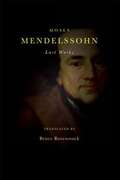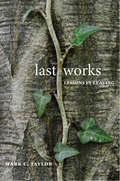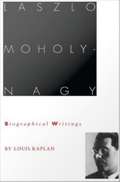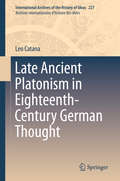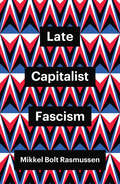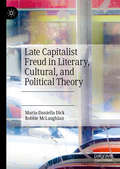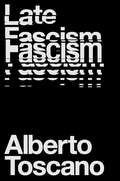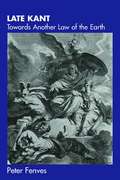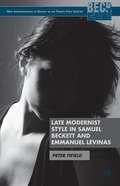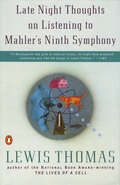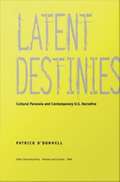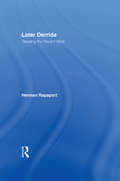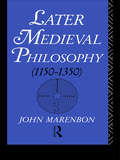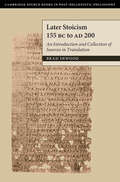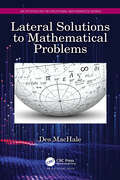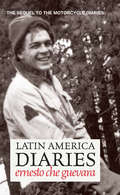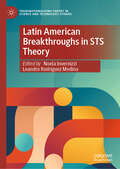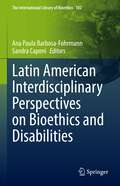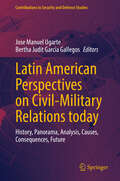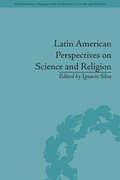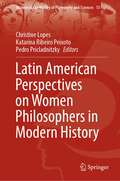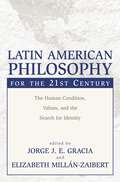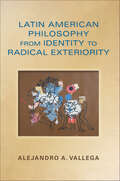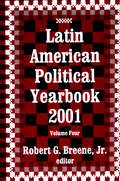- Table View
- List View
Last Works
by Moses Mendelssohn Bruce RosenstockMoses Mendelssohn (1729-1786) was the central figure in the emancipation of European Jewry. His intellect, judgment, and tact won the admiration and friendship of contemporaries as illustrious as Johann Gottfried Herder, Gotthold Ephraim Lessing, and Immanuel Kant. His enormously influential Jerusalem (1783) made the case for religious tolerance, a cause he worked for all his life. Last Works includes, for the first time complete and in a single volume, the English translation of Morning Hours: Lectures on the Existence of God (1785) and To the Friends of Lessing (1786). Bruce Rosenstock has also provided an historical introduction and an extensive philosophical commentary to both texts. At the center of Mendelssohn's last works is his friendship with Lessing. Mendelssohn hoped to show that he, a Torah-observant Jew, and Lessing, Germany's leading dramatist, had forged a life-long friendship that held out the promise of a tolerant and enlightened culture in which religious strife would be a thing of the past. Lessing's death in 1781 was a severe blow to Mendelssohn. Mendelssohn wrote his last two works to commemorate Lessing and to carry on the work to which they had dedicated much of their lives. Morning Hours treats a range of major philosophical topics: the nature of truth, the foundations of human knowledge, the basis of our moral and aesthetic powers of judgment, the reality of the external world, and the grounds for a rational faith in a providential deity. It is also a key text for Mendelssohn's readings of Spinoza. In To the Friends of Lessing, Mendelssohn attempts to unmask the individual whom he believes to be the real enemy of the enlightened state: the Schwärmer, the religious fanatic who rejects reason in favor of belief in suprarational revelation.
Last Works: Lessons in Leaving
by Mark C. TaylorA powerful consideration of the lessons imparted in the final works of essential writers and philosophers For many today, retirement and the leisure said to accompany it have become vestiges of a slower, long-lost time. In a world where the sense of identity is tied to work and careers, to stop working often is to become nobody. In this deeply perceptive and personal exploration of last works, Mark C. Taylor poignantly explores the final reflections of writers and thinkers from Kierkegaard to David Foster Wallace. How did they either face or avoid ending and leaving? What do their lessons in ending teach us about living in the time that remains for us? Some leavings brought relief, even joy, while others brought pain and suffering. Whether the cause was infirmity, impending death, or simply exhaustion and ennui, the ways these influential voices fell silent offer poignant examples of people withdrawing from the world’s stage. Throughout this learned and moving book, Taylor probes how the art of living involves learning to leave gracefully.
Laszlo Moholy-Nagy: Biographical Writings
by Louis KaplanMarking the centenary of the birth of Laszlo Moholy-Nagy (1895-1946), this book offers a new approach to the Bauhaus artist and theorist's multifaceted life and work--an approach that redefines the very idea of biographical writing. In Laszlo Moholy-Nagy, Louis Kaplan applies the Derridean deconstructivist model of the "signature effect" to an intellectual biography of a Constructivist artist. Inhabiting the borderline between life and work, the book demonstrates how the signature inscribed by "Moholy" operates in a double space, interweaving signified object and signifying matter, autobiography and auto-graphy. Through interpretative readings of over twenty key artistic and photographic works, Kaplan graphically illustrates Moholy's signature effect in action. He shows how this effect plays itself out in the complex of relations between artistic originality and plagiarism, between authorial identity and anonymity, as well as in the problematic status of the work of art in the age of technical reproduction. In this way, the book reveals how Moholy's artistic practice anticipates many of the issues of postmodernist debate and thus has particular relevance today. Consequently, Kaplan clarifies the relationship between avant-garde Constructivism and contemporary deconstruction. This new and innovative configuration of biography catalyzed by the life writing of Moholy-Nagy will be of critical interest to artists and writers, literary theorists, and art historians.
Late Ancient Platonism in Eighteenth-Century German Thought (International Archives of the History of Ideas Archives internationales d'histoire des idées #227)
by Leo CatanaThis work synthesizes work previously published in leading journals in the field into a coherent narrative that has a distinctive focus on Germany while also being aware of a broader European dimension. It argues that the German Lutheran Christoph August Heumann (1681-1764) marginalized the biographical approach to past philosophy and paved the way for the German Lutheran Johann Jacob Brucker’s (1696-1770) influential method for the writing of past philosophy, centred on depersonalised and abstract systems of philosophy. The work offers an authoritative and engaging account of how late ancient Platonism, Plotinus in particular, was interpreted in eighteenth-century Germany according to these new precepts. Moreover, it reveals the Lutheran religious assumptions of this new approach to past philosophy, which underpinned the works of Heumann and Brucker, but also influential reviews that rejected the English Plato translator Thomas Taylor (1758-1835) and his understanding and evaluation of late ancient Platonism.
Late Capitalist Fascism (Theory Redux)
by Mikkel Bolt RasmussenWhat if fascism didn’t disappear at the end of WW II with the defeat of Hitler and Mussolini? Even more troubling, what if fascism can no longer be confined to political parties or ultra nationalist politicians but has become something much more diffuse that is spread across our societies as cultural expressions and psychological states? This is the disturbing thesis developed by Mikkel Bolt Rasmussen, who argues that late capitalism has produced hollowed-out and exchangeable subjectivities that provide a breeding ground for a new kind of diffuse, banal fascism. The overt and concentrated fascism of the new fascist parties thrives on the diffuse fascism present in social media and everyday life, where the fear of being left behind and losing out has fuelled resentment towards foreigners and others who are perceived as threats to a national community under siege. Only by confronting both the overt fascism of parties and politicians and the diffuse fascism of everyday life will we be able to combat fascism effectively and prevent the slide into barbarism.
Late Capitalist Freud in Literary, Cultural, and Political Theory
by Robbie McLaughlan Maria-Daniella DickLate Capitalist Freud in Literary, Cultural, and Political Theory proposes that late Freudian theory has had an historical influence on the configuration of contemporary life and is central to the construction of twenty-first-century capitalism. This book investigates how we continue to live in the Freudian century, turning its attentions to specific crisis points within neoliberalism—the rise of figures like Trump, the development of social media as a new superego force, the economics that underpin the wellness and self-care industries as well as the contemporary consumption of popular culture—to maintain the continued historical importance of Freudian thought in all its dimensions. Drawing on psychoanalytic theory, literary theory, cultural studies, and political theory, this book assesses the contribution that an historical and theoretical consideration of the late Freud can make to analyzing certain aspects of late capital.
Late Fascism: Race, Capitalism and the Politics of Crisis
by Alberto ToscanoHow do we understand the return of fascism today?In a world shaken by ecological, economic and political crises, the forces of authoritarianism and reaction seem to have the upper hand. How should we name, map and respond to this state of affairs?Late Fascism turns to theories of fascism produced in the past century, testing their capacity to illuminate our moment and challenging many of the commonplaces that debate on this extremely charged term devolves into. It can be tempting for any contemporary assessment of fascism to reach for historical analogy. Fascism is defined by returns and repetitions, but it is not best approached in terms of steps and checklists dictated by a selective reading of Italian Fascism or National Socialism.Rather than treating fascism as an unrepeatable phenomenon or identifying it with a settled configuration of European parties, regimes, and ideologies, Toscano approaches fascism as a problem and a process, one that is intimately linked to capitalism's demands for domination. Drawing especially on Black radical and anti-colonial theories of racial fascism, Late Fascism makes clear the limits of identifying fascism simply with the political violence of bygone European regimes. Developing anti-fascist theory is a vital and urgent task. From the "Great Replacement" to campaigns against critical race theory and "gender ideology", today's global far-right is launching lethal panics about the threats to traditional political, sexual and racial regimes. Late Fascism allows us to rediscover some truly inspiring anti-fascist thinkers, rooted in their turn in largely anonymous collective practices of worldmaking against domination, traditions of the oppressed that remain a resource for those set on dismantling the hierarchies and segregations that the partisans of Order and Tradition seek to revive and reimpose.
Late Kant: Towards Another Law of the Earth
by Peter FenvesImmanuel Kant spent many of his younger years working on what are generally considered his masterpieces: the three Critiques. But his work did not stop there: in later life he began to reconsider subjects such as anthropology, and topics including colonialism, race and peace. In Late Kant, Peter Fenves becomes one of the first to thoroughly explore Kant's later writings and give them the detailed scholarly attention they deserve. In his opening chapters, Fenves examines in detail the various essays in which Kant invents, formulates and complicates the thesis of 'radical evil' - a thesis which serves as the point of departure for all his later writings. Late Kant then turns towards the counter-thesis of 'radical mean-ness', which states that human beings exist on earth for the sake of another species or race of human beings. The consequences of this startling thesis are that human beings cannot claim possession of the earth, but must rather prepare the earth for its rightful owners.Late Kant is the first book to develop the 'geo-ethics' of Kant's thought, and the idea that human beings must be prepared to concede their space for another kind of human. It is essential reading for anyone interested in the later works of Immanuel Kant.
Late Marx and the Russian Road: Marx and the Peripheries of Capitalism (Monthly Review Press Classic Titles #26)
by Teodor ShaninExplores Marx’s attitude to “developing” societies. Includes translations of Marx’s notes from the 1880s, among the most important finds of the last century.
Late Modernist Style in Samuel Beckett and Emmanuel Levinas
by Peter FifieldBeckett and Levinas are of central importance to critical debates about literary ethics. Rather than suggest the presence of literary and ethical value in the wake of the Second World War, this book argues that both thinkers waged a sustained attack on the principles of literature, weaving narrative and descriptive doubt through phenomenology, prose, and drama. Peter Fifield uses conceptual and rhetorical figures shared by Beckett and Levinas - such as the face, the trace, re-commencement, hyperbole, the saying and the said - to address a wide range of texts by both authors, arguing for a Levinasian manner of reading that is distinctly non-ethical.
Late Night Thoughts on Listening to Mahler's Ninth Symphony
by Lewis ThomasThis magnificent collection of essays by scientist and National Book Award-winning writer Lewis Thomas remains startlingly relevant for today’s world. Luminous, witty, and provocative, the essays address such topics as “The Attic of the Brain,” “Falsity and Failure,” “Altruism,” and the effects the federal government’s virtual abandonment of support for basic scientific research will have on medicine and science.Profoundly and powerfully, Thomas questions the folly of nuclear weaponry, showing that the brainpower and money spent on this endeavor are needed much more urgently for the basic science we have abandoned—and that even medicine’s most advanced procedures would be useless or insufficient in the face of the smallest nuclear detonation. And in the title essay, he addresses himself with terrifying poignancy to the question of what it is like to be young in the nuclear age. “If Wordsworth had gone to medical school, he might have produced something very like the essays of Lewis Thomas.”—TIME “No one better exemplifies what modern medicine can be than Lewis Thomas.”—The New York Times Book Review
Latent Destinies: Cultural Paranoia and Contemporary U.S. Narrative
by Patrick O'DonnellLatent Destinies examines the formation of postmodern sensibilities and their relationship to varieties of paranoia that have been seen as widespread in this century. Despite the fact that the Cold War has ended and the threat of nuclear annihilation has been dramatically lessened by most estimates, the paranoia that has characterized the period has not gone away. Indeed, it is as if--as O'Donnell suggests--this paranoia has been internalized, scattered, and reiterated at a multitude of sites: Oklahoma City, Waco, Ruby Ridge, Bosnia, the White House, the United Nations, and numerous other places. O'Donnell argues that paranoia on the broadly cultural level is essentially a narrative process in which history and postmodern identity are negotiated simultaneously. The result is an erasure of historical temporality--the past and future become the all-consuming, self-aware present. To explain and exemplify this, O'Donnell looks at such books and films as Libra, JFK, The Crying of Lot 49, The Truman Show, Reservoir Dogs, Empire of the Senseless, Oswald's Tale, The Executioner's Song, Underworld, The Killer Inside Me, and Groundhog Day. Organized around the topics of nationalism, gender, criminality, and construction of history, Latent Destinies establishes cultural paranoia as consonant with our contradictory need for multiplicity and certainty, for openness and secrecy, and for mobility and historical stability. Demonstrating how imaginative works of novels and films can be used to understand the postmodern historical condition, this book will interest students and scholars of American literature and cultural studies, postmodern theory, and film studies.
Later Derrida: Reading the Recent Work
by Herman Rapaport"First Published in 2002, Routledge is an imprint of Taylor & Francis, an informa company."
Later Medieval Philosophy: An Introduction
by John MarenbonFirst published in 1991. Routledge is an imprint of Taylor & Francis, an informa company.
Later Stoicism 155 BC to AD 200: An Introduction and Collection of Sources in Translation
by Brad InwoodMost modern readers of the Stoics think first of later authors such as Seneca, Epictetus and Marcus Aurelius. Existing works like Long and Sedley's The Hellenistic Philosophers concentrate on the Stoics of the early school. This book focusses on the more influential later school, including key figures like Panaetius and Posidonius, and provides well-chosen selections from the full range of Stoic thinkers. It emphasizes their important work in logic, physics and cosmology as well as in ethics. Fresh translations and incisive commentary present a picture of Stoic thought informed by up-to-date historical research and philosophical analysis. The book will be essential for scholars and students of ancient philosophy and of Hellenistic and Roman culture.
Lateral Solutions to Mathematical Problems (AK Peters/CRC Recreational Mathematics Series)
by Desmond MacHaleLateral Solutions to Mathematical Problems offers a fresh approach to mathematical problem solving via lateral thinking. Lateral thinking has long been used informally by good mathematics teachers and lecturers to spice up their material and interest their students in the more artistic aspects of mathematical problem solving. In this book, the author attempts to carry out this process formally, with reference to specific, non-technical problems that are easily understood and explained at an intermediate level.This book is appropriate for interested high school students, undergraduates and postgraduates, looking for relief from technical material and also looking for insight into the methodology of mathematics; for teachers and lecturers looking for a novel approach to course material; and anyone interested in both mathematics and lateral thinking.
Latin America Diaries
by Ernesto Che Guevara"A wonderful glimpse into the maturing mind of a great man and a vital companion to the previous Che diaries."-Michael McCaughan, The Irish Times"Guevara . . . chronicles labor uprisings and resistance against the influences and interests of the US and its intelligence operations. Guevara's passions for history, archaeology, and science are also apparent in this absorbing glimpse of the development of a legendary revolutionary figure."-Vanessa Bush, Booklist"This second volume of travel diaries by revolutionary icon Guevara (after Motorcycle Diaries) shows the 25-year-old rebel wandering around South America in the latter half of 1953."-Publishers WeeklyThis sequel to The Motorcycle Diaries includes letters, poetry, and journalism that document Ernesto Che Guevara's second Latin American journey following his graduation from medical school. After traveling through Bolivia, Peru, Ecuador, and Central America, Ernesto witnesses the 1954 US-inspired coup in Guatemala. He flees to Mexico where he encounters Fidel Castro, marking the beginning of a political partnership that profoundly changes the world and Che himself.This new, expanded edition has been fully revised especially for Ocean Press by Che's widow Aleida March, meticulously correcting her own work of checking Che's handwriting. Includes thirty-two pages of unpublished photos, including photos taken by Che's son Ernesto as he retraces his father's footsteps. Features a prologue by Alberto Granado, Che's traveling companion in The Motorcycle Diaries.
Latin American Breakthroughs in STS Theory (Transnationalizing Theory in Science and Technology Studies)
by Leandro Rodriguez Medina Noela InvernizziThis book enriches Latin American Science and Technology Studies by making a pioneering contribution to theories from its geopolitical margins. Rather than merely challenging Northern dominance, it fosters dialogue between Northern and Southern scholars, highlighting the complex, multi-situated development of science and technology and contributing to the field&’s diversification and internationalization.
Latin American Interdisciplinary Perspectives on Bioethics and Disabilities (The International Library of Bioethics #102)
by Ana Paula Barbosa-Fohrmann Sandra CaponiThis book provides a critical analysis of the experiences of people with disabilities in Latin America. It covers a wide range of topics related to intellectual and psychosocial disabilities. Written by Latin American researchers and adopting an interdisciplinary perspective, it provides an original sociocultural contribution to bioethics and disability studies literature. It presents an in-depth overview of philosophical, ethical, legal, political and social issues. At the same time, it offers a contribution to the global scientific community inasmuch it discusses theoretical references from South America in connection with those from Europe and the United States. The basic questions dealt with range from criteria for human flourishing to questions of philosophy of mind, and neuroethics through phenomenological and aesthetic approaches to intellectual and psychosocial disabilities. The legal and political investigations explore the rights of those affected and the processes of their self-organization. The authors address the dynamics of medicalization and demedicalization, the practices of psychiatric institutionalization and the treatment of children with antipsychotics. This book appeals to psychologists, social scientists, bioethicists, healthcare personnel, philosophers, and lawyers working with cases related to people with disabilities.
Latin American Perspectives on Civil-Military Relations today: History, Panorama, Analysis, Causes, Consequences, Future (Contributions to Security and Defence Studies)
by Jose Manuel Ugarte Bertha Judit Garcia GallegosThis edited volume discusses civil-military relations in Latin America. Written by regional experts, the chapters take a multifaceted approach, combining a general overview of the situation in the region, a historical analysis of its evolution and its causes, and an in-depth analysis of national cases: Argentina, Brazil, Chile, Colombia, Ecuador, Uruguay and Venezuela. The case studies examine power relations between armed forces and their respective governments—comparing the degree to which governments exercise political leadership, direction, supervision, and control over the armed forces and the degree of interference of armed forces in aspects of the State unrelated to traditional military missions of protection of sovereignty, independence, and territorial integrity against external aggressions. Giving a nuanced view of a complex problem that continues to have a strong impact on political stability, human rights, and the quality of life in the region, the book will be of particular interest to researchers and students of international relations, Latin American politics, defense, and security studies.
Latin American Perspectives on Science and Religion ("International Perspectives on Science, Culture and Society" #1)
by Ignacio SilvaLatin America plays an increasingly important role in the development of modern Christianity yet it has been underrepresented in current scholarship on religion and science. In this first book on the subject, contributors explore the different ways that religion and science relate to each other.
Latin American Perspectives on Women Philosophers in Modern History (Women in the History of Philosophy and Sciences #13)
by Christine Lopes Katarina Ribeiro Peixoto Pedro PricladnitzkyThis book presents Latin American Perspectives on women philosophers, comprising selected articles from the First International Conference of Women in Modern Philosophy that took place in Rio de Janeiro City, Brazil, Latin America, in June of 2019. The conference brought together over twenty national, transnational, and international philosophers from seven countries, whose work combines historical and analytical insight to recover the philosophical legacy of women philosophers. Historical and analytical work on women’s philosophical thought constitute efforts to re-conceptualize what counts as philosophical knowledge and re-appraise the epistemic relevance of written material that women thinkers produced for most of history. This collection and the conference that gave origin to it are testimony to the enduring power of multinational and multicultural philosophical collaboration.
Latin American Philosophy for the 21st Century: The Human Condition, Values, and the Search for Identity
This excellent collection is the most complete anthology of Latin American philosophers in English available today. Leading philosophers from several different Latin American countries and from various periods in the history of Latin American thought are included. Though the main focus is upon the rich contemporary period, several key texts from the colonial and independent period are included to provide the reader with some historical background. Dividing the work into four major sections — Colonial Beginnings and Independence, Philosophical Anthropology, Values, and The Search for Identity — the editors complement their selections with introductions to the themes covered in each section and brief biographies of each author. An up-to-date bibliography provides the reader with information on the latest work done in the field, both in English and Spanish.This outstanding compilation is accessible enough to serve as an introduction to the field, while at the same time it is sufficiently sophisticated to be of use even to advanced scholars specializing in Latin American philosophy. It will serve as an important resource for students and teachers dedicated to a more pluralistic canon of philosophical texts.
Latin American Philosophy from Identity to Radical Exteriority (World Philosophies)
by Alejandro A. VallegaWhile recognizing its origins and scope, Alejandro A. Vallega offers a new interpretation of Latin American philosophy by looking at its radical and transformative roots. Placing it in dialogue with Western philosophical traditions, Vallega examines developments in gender studies, race theory, postcolonial theory, and the legacy of cultural dependency in light of the Latin American experience. He explores Latin America's engagement with contemporary problems in Western philosophy and describes the transformative impact of this encounter on contemporary thought.
Latin American Political Yearbook: 2001
by Jr. DentonIn the fourth volume of this annual series, Robert G. Breene provides a comprehensive overview, analysis, and summary of the major political and economic trends and events in Central America, MERCOSUR, Andean and Caribbean nations, and Mexico. Analyzing these developments within the individual nations, their respective regions, and the world at large, the yearbook offers a timely look at the relevant background and information necessary to understand the changing nature of politics in Latin America today.The volume's opening two chapters continue the coverage of the earlier volumes, presenting details of various Latin American elections with relevant background information. The remaining five chapters cover various aspects of the development of regional history during the year 2001. Chapter 3 on U.S. diplomacy examines the immediate impact of President Clinton's various Latin American trips and initiatives. The Hemispheric Left and support for the Hemispheric Left are treated in general terms in chapter 4, while the next three chapters examine specific nations, Colombia (chapter 5), Venezuela (chapter 6), and Cuba (chapter 7) where these forces were of particular importance during the year.The material presented on Cuba is of particular interest considering the September 11, 2001 outrage; although, as the editor notes, it remains to be seen if the measures adopted at Guantanamo did keep Castro from dabbling in the aftermath. The final chapter continues the series' discussion of Latin American international organizations such as the Grupo de Rio and the Organization of American States. The continuity of the information presented in these volumes is one of their valuable assets as is the examination of the Disinformation Operation (DO) of the Hemispheric Left. Disinformation examples are many, ranging from the Harbury DO in Guatemala through Ruz Castro's Foro Soo Paolo and the totally misrepresented Zapatista National Liberation Army to the Great Gringo DO continues to operate with impunity.This is a reference volume with a point of view. It is brimming with facts and provides information not readily available through the American media. Compact, yet comprehensive, it is essential reading for political scientists, Latin American area specialists, and historians.
